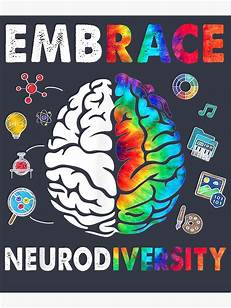In this follow up to my first article, https://cracksoflife.com/neurodivergent-huh/ I am sharing what I found current research indicates are certain “signs and symptoms,” of a person who is neurodivergent (simply put: a person whose brain literally thinks and processes differently from what is considered normal.) After doing a little amateur research, the following is my interpretation of possible signs and symptoms and how I would explain it to a friend after conversing with Dr. Google.
A neurodivergent person might:
- Have some unusual responses to sensory inputs – such as being sensitive to loud sounds, crowds, being too hot or too cold, tapping or jarring sounds that others find annoying but neurodivergent people feel like they want to crawl out of their skin until it stops.
- Some difficulties with social communication – such as having trouble holding eye contact while talking to someone or being unable to pick up on body language clues. Overthinking and becoming too focused on either what you are going to say next or trying to visually write down what they are saying in your mind (like you do with your sticky notes) before it completely vanishes out the other ear…despite effort.
- Learning difficulties – this can be a wide range of things including, but never limited to: trouble focusing, trouble following spoken language (for me this looks like just about anyone talking to me and me thinking I am hearing them just fine but I often literally misunderstand the words spoken and then half of what they said just flew right out the other ear—EVEN when I am trying to listen and retain).
- Ill-functioning working memory and executive functioning – whew, I will likely write an article on executive functioning by itself because I had no idea how awful I am at those skills, but how understanding that I am impaired in that area has helped make SO much sense of the things I hated about myself for not being able to do “like I should” or “if I only tried harder.”
- Other possible signs can include things such as speech/language challenges, having issues with being inflexible such as not being able to adapt to changing situations or not wanting to let go of habits/interests typically associated with an age you have far surpassed, rocking and other tics.
What I always find “fun” is reading through any kind of list of signs and symptoms and going, well, yeah that one…. dang it, that one too–but maybe not all the time….well, I didn’t think about that not being normal….dammit is this some new thing that describes what’s wrong with me?? Ha. I say that semi-lightly, but it’s a double-edged sword for me. It’s nice to get answers, but I have plenty of diagnoses and quirks as it is, thank you very much.
I think I have always been extremely interested in what makes people act and feel the way they do. It’s fascinating to read about something and have one of those “ah ha” moments and maybe even get emotional because it’s like you finally have some validation as to the things you might do that are “weird” but that is just how you are. You have possibly tried to improve or change, but some of these things just seem engrained into your brain.
That’s likely because some of these things are engrained!
I don’t want to come across as one of those people who thinks that if we can label our less than stellar behavior then that makes it okay and we don’t have to try to “do better.” That is not the case; I simply think it’s enlighting to try to understand why we see things differently, respond differently to situations and stimuli, and how we can use the unique traits to show strengths we didn’t realize we had.
In closing, I am in no way an expert on this subject nor am I claiming any of this information to be my own. The point is to make you think for yourselves. If any of these things sound like you—or someone you love—or someone you are trying really hard to work with at the office—then look neurodivergent up for yourself. The worst thing that can happen is you either learn a little about yourself, someone else…or both.
If you have interest in any other behavioral/medical/social conditions and would be interested in reading an article on them, please leave me a comment on the website, on my Facebook page “Cracks of Life,” or send me an email: amanda@cracksoflife.com
